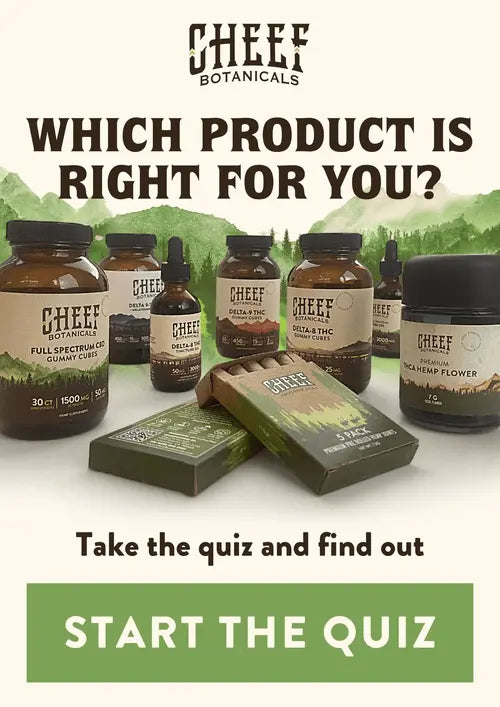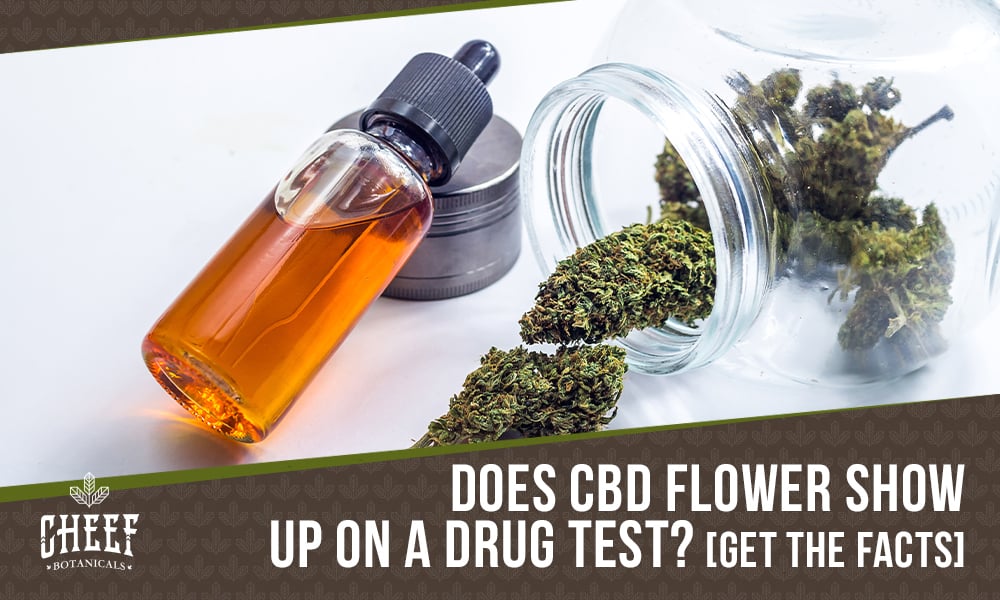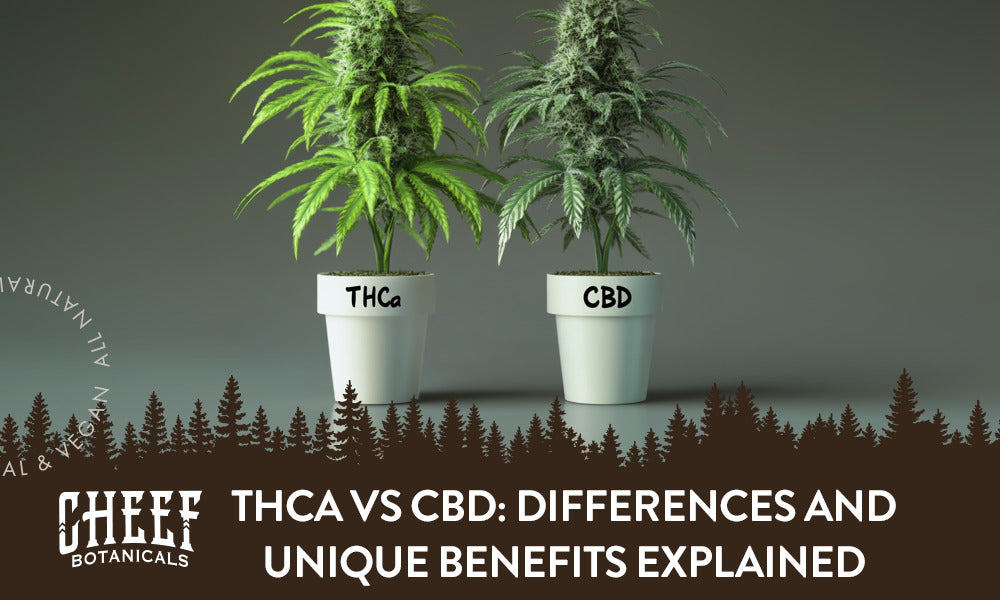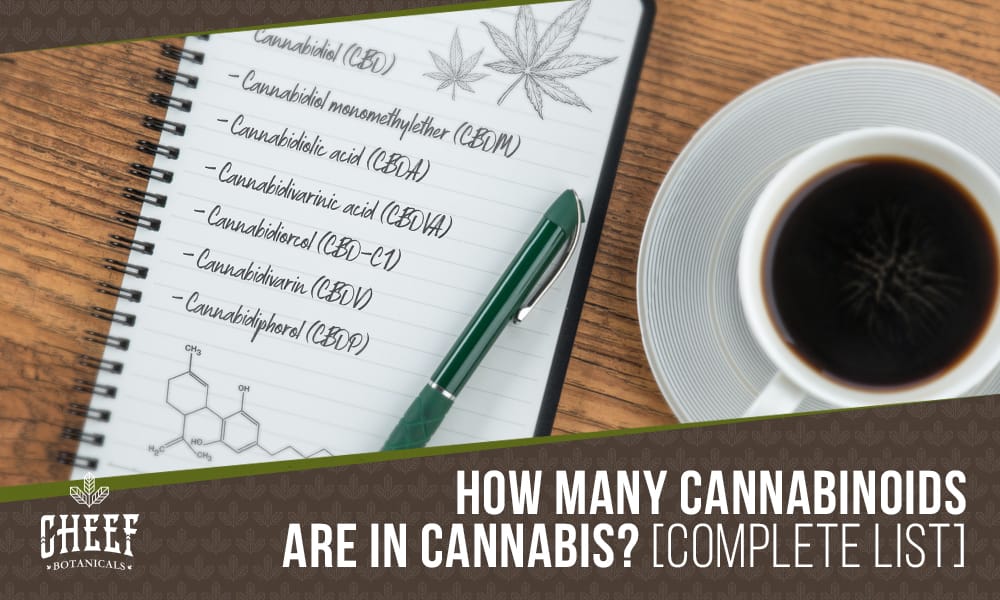People are increasingly turning to CBD products for their soothing effects and wellness benefits. Many wonder about the connection between cannabidiol (CBD) and cannabis. If you've ever asked, "Does CBD flower show up on a drug test?" this guide will provide all the answers you need.
By the end of this article, you'll discover that there are CBD products to suit every individual and lifestyle. Let’s explore CBD flower and whether it can appear on a drug test.



What is CBD Flower?
CBD flower, sometimes referred to as hemp flower, is a non-intoxicating product derived from cannabis plants. There are two types of cannabis: hemp and marijuana. Hemp plants have high CBD levels and contain 0.3% or less tetrahydrocannabinol (THC). Both CBD and THC are cannabinoids, compounds from the cannabis plant. CBG is another one of these cannabinoids that is quickly rising in popularity. Still, these are just three of the over 100 cannabinoids that scientists have discovered in cannabis plants. By definition, marijuana is a cannabis plant that contains greater than 0.3% THC levels. On the other hand, CBD is a hemp-derived product and should never contain more than 0.3% THC. "Flower," also known as nugs or buds, refers to the CBD-rich blossoms that grow from hemp plants. Hemp flower contains the highest concentration of CBD in the entire plant. This CBD flower can be vaporized, smoked, or turned into other CBD hemp products. CBD extraction is done by grinding up hemp and running liquid CO2 through the plant material.
Is CBD Flower Legal?
Yes! CBD flower is completely legal. This is because the 2018 Farm Bill legalized the sale and production of industrial hemp in the United States. The bill also legalized items made from hemp (such as CBD products) as long as they contain 0.3% or less THC. The government considers a plant to be marijuana if it contains more than 0.3% THC. Officials destroy these plants to ensure that consumers aren't sold CBD containing too much THC.Can CBD Flower Get You High?
No, CBD flower cannot get you high. In large doses, THC can induce intoxicating feelings. However, since CBD contains very little to no THC, it is not enough to cause any intoxicating feelings. Since THC induces intoxicating effects, you may be wondering why some CBD products contain any THC at all. Full spectrum products include low levels of THC to strengthen the entourage effect. The entourage effect refers to the boost in effectiveness when compounds found in hemp are ingested simultaneously. When all the compounds react with each other, they can maximize the benefits of CBD. The more hemp-derived components that are taken at the same time, the greater CBD's entourage effect. However, the entourage effect is still present in CBD if the product does not contain any THC. The effects are even more relaxing and tranquil when a low amount of THC (0.3% or less) is added. Maximizing the entourage effect is one of the best ways to experience CBD, but it's certainly not the only way. Trace levels of THC should not be enough to trigger a positive drug test. However, with repeated use, THC levels can build up in your body, resulting in a positive drug test result.Full Spectrum vs. Broad Spectrum vs. Isolate
How do you know if you're using a CBD product that has THC? Check whether the item is full or broad spectrum CBD. Full spectrum CBD products contain all the compounds naturally found in hemp (including small amounts of THC). Broad spectrum CBD is similar to full spectrum products, but does not contain any THC at all. This is the ideal choice for anyone concerned with drug tests. Even though high-quality full spectrum products should rarely result in a positive result, broad spectrum CBD is a great alternative. If you'd like nothing but pure cannabidiol, consider CBD isolate products. This fine white powder is odorless and tasteless, containing over 99% pure CBD molecules. Isolates are extremely versatile and can give various products a CBD boost.Related Article: What Is CBD Isolate Used For? 4 Common Uses Explained

Does CBD Flower Show Up On a Drug Test?
Does CBD show up when drug testing? The short answer is no, CBD will not show up on a drug test. Most drug tests only test for THC and not CBD. Since there are low levels of THC in hemp flower, it should not test positive for THC. However, there are trace levels of THC in full spectrum CBD products. Low THC levels should not cause you to fail a drug test, but there is a slight chance of this happening, as THC can build up with repeated use. Additionally, not all drug tests are completely accurate, and the presence of CBD may cause a false reading. While it is rare for CBD flower or a top-tier full-spectrum product to trigger a failed drug test, it is not impossible. This is what draws some to broad-spectrum CBD, which contains no THC. CBD isolate, which is almost entirely made of cannabidiol molecules, is another THC-free option. Unfortunately, when it comes to CBD flower, there is no THC-free strain. However, some flowers have very low amounts of THC. Keep this in mind if you use a CBD strain before a drug test, but rest assured that you'd have to consume a large amount of hemp for the test to come back positive. Use CBD products as directed on the packaging. Improper or excessive use before a screening could affect the test results. Since CBD flower is perfectly legal, you can also inform the person giving you your test that you've used some cannabidiol recently. There is also a chance that a urine-based drug test can give a false positive if other medicines are present in the body. Drugs such as dronabinol, nonsteroidal anti-inflammatory drugs (ibuprofen), pantoprazole, or efavirenz may trigger a false positive. Secondhand cannabis smoke can also affect the outcome of your drug screening.How Long Does CBD Flower Stay in Your System?
Generally, CBD can last in your system for 2-5 days. However, it is perfectly normal for CBD to last in some people's systems for weeks. No matter how long CBD stays in your system, it will not result in a positive drug test. Why does CBD last longer in some people's bodies than others? Certain factors, such as how much or how often you take it, will change the amount of CBD concentration in anyone's body. Other variables include your tolerance, method of ingestion, and your overall health. Body mass index, water content, metabolism, and size can affect how people experience CBD. Some people have a higher tolerance than others. This could be why CBD stays in your system longer than someone of a similar height and weight.Method of Consumption Matters
CBD can be mixed into food, added to a drink, swallowed as CBD capsules, dropped under the tongue, inhaled, rubbed on, and eaten as an edible (just to name a few). The form of your CBD has a large impact on how long it stays in your body. The effects of inhaling hemp flower smoke or vapor can be felt almost instantaneously, but it also leaves the body quickly. CBD oil, on the other hand, can last in your bloodstream much longer if swallowed. Smoking CBD results in a quicker experience because swallowed oil must first be metabolized.Edibles
The metabolization that swallowed CBD must go through results in longer-lasting effects than when inhaled. Other food, drink, and medication that our body is digesting when we use CBD may affect the amount of time it takes to enter the bloodstream. This is why there is no universal answer for how long cannabidiol will stay in your system. What people eat can also affect how long CBD stays in their system. If you take CBD oil after a full meal it will be metabolized by your body slower than if taken on an empty stomach, but the effects will last slightly longer.How Long Will THC Stay In Your System?
Typically, THC stays in the system for up to 15 days. However, THC may still be present in one's urine over 30 days after using cannabis products. Keep in mind that the presence of THC in your urine does not inherently mean you'll test positive for THC. A drug test is affected by the presence of cannabinoids, such as CBD or THC. Though, it's the amount of that compound that has the largest impact on the test results. For example, the low levels of THC found in full spectrum products should not cause a failed screening, even though there was THC in the body. How much is too much THC? Well, it depends on which type of test you take. The four most popular drug tests take samples of urine, blood, saliva, or hair.



 CBD Gummies - Top Seller
CBD Gummies - Top Seller
 CBD + THC Gummy - Excellent Choice
CBD + THC Gummy - Excellent Choice
 CBD Hemp Flower - Highly Rated
CBD Hemp Flower - Highly Rated
 Full Spectrum CBD Oil - Good Value
Full Spectrum CBD Oil - Good Value



Leave a comment
This site is protected by hCaptcha and the hCaptcha Privacy Policy and Terms of Service apply.